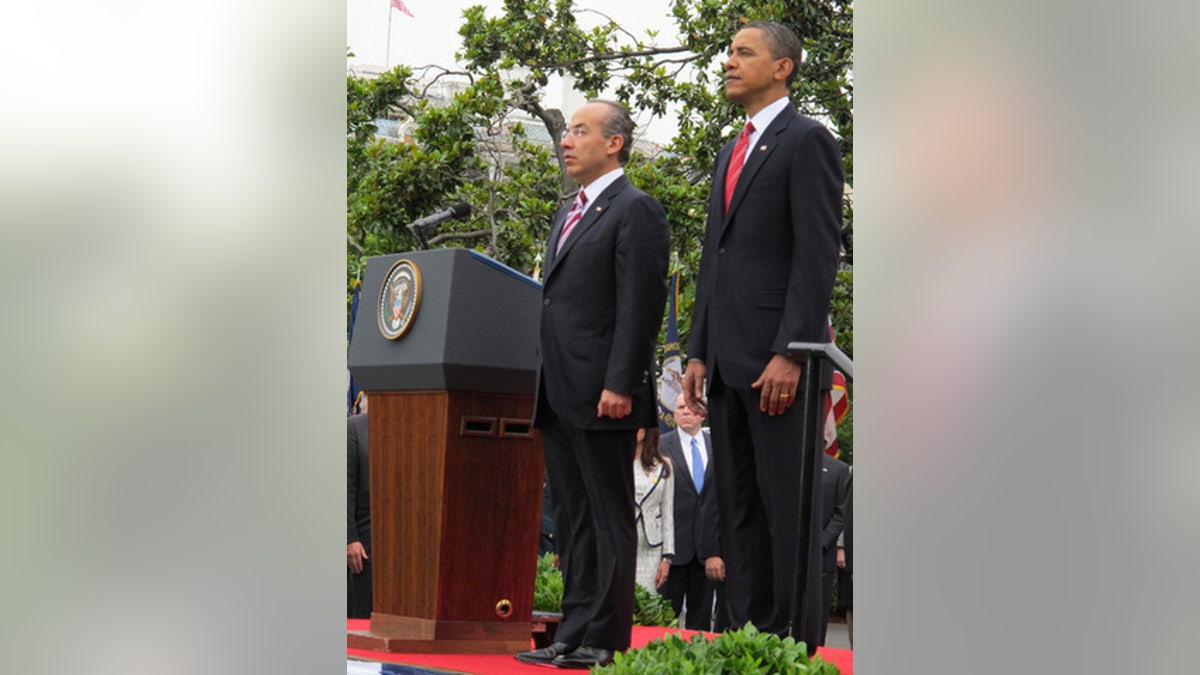
President Obama on Wednesday reaffirmed his administration's commitment to securing the border, and vowed to work with Congress to pass comprehensive immigration reform.
But the president was forced to go beyond prepared sound bites and address the giant elephant in the room -- the recently-passed Arizona law that requires individuals to carry proof of citizenship or valid immigration papers and gives law enforcement the right to detain anyone suspected of being in the country illegally.
With his Mexican counterpart at his side, Mr. Obama said that the Arizona law was a "misdirected effort of the immigration system."
He was responding to Mexican President Felipe Calderon's assessment that the law is "partial and discriminatory."
Mr. Obama was asked by a reporter to elaborate on his position and to clarify whether he agreed with Calderon's characterization of the law.
"I think the Arizona law has the potential of being applied in a discriminatory fashion," the president said in a joint press conference in the Rose Garden. "It gives the possibility of individuals that are deemed suspicious of being illegal immigrants from being harassed or arrested. And the judgments that are going to be made in applying this law are troublesome."
The president said that he has asked the Justice Department to review the law to determine "whether it comports both with our core values and existing legal standards." Once that examination is complete, Mr. Obama said he will make a decision about how to address the legislation.
He took the opportunity to push for Congressional action on immigration reform, saying that the Arizona law represents the American public's "frustration" with a what he called a broken system and "failures of the federal government" to get reform passed.
The president acknowledged that immigration problems stem from the fact that many illegals from Mexico cross over into the United States seeking a better future. "Some of the pressures just arise out of economics," he said, pointing to individuals who enter the U.S. illegally because they will make more money here.
He implied that there is a delicate balance between understanding that people want a better life and enforcing the law in order to keep the country safe.
But the president said he believes that the U.S. is capable of being a nation of law and a nation of immigrants.
"They need to pay a fine, they need to pay back taxes," Mr. Obama said of those entering the country illegally. "I believe they should learn English. I believe it's important for them to get to the back of the line, not the front." The president added however, that he believes in a path to citizenship for such individuals.
"If we get that done you will be less likely to see the measures that we saw in Arizona."
One of the aspects of the Arizona law that is being reviewed by the Obama Justice Department is the issue of civil rights as it relates to the ability of law enforcement to detain suspicious individuals. The American Civil Liberties Union and other organizations filed a class action lawsuit on Monday that challenges the constitutionality of the Arizona law. The lawsuit claims the legislation invites racial profiling and infringes on the free speech rights of day laborers.
In the three weeks since Arizona Republican Governor Jan Brewer signed the law, cities and groups across the country have called for boycotts of the state.
But a recent Fox News/Opinion Dynamics Poll indicates that most American voters think Arizona was right to pass its own immigration law, with a majority of respondents saying the White House should wait and see how it works before trying to overturn it.
Sixty-one percent of registered voters believe the state did the right thing by taking matters into its own hands, while 27 percent say the state should have waited for the federal government to take action. The support for the law is high among Republicans and independents, but Democrats are divided. Forty-three percent think the state acted correctly, while 41 percent believe Arizona should have allowed the government to take the lead on passing reform.




